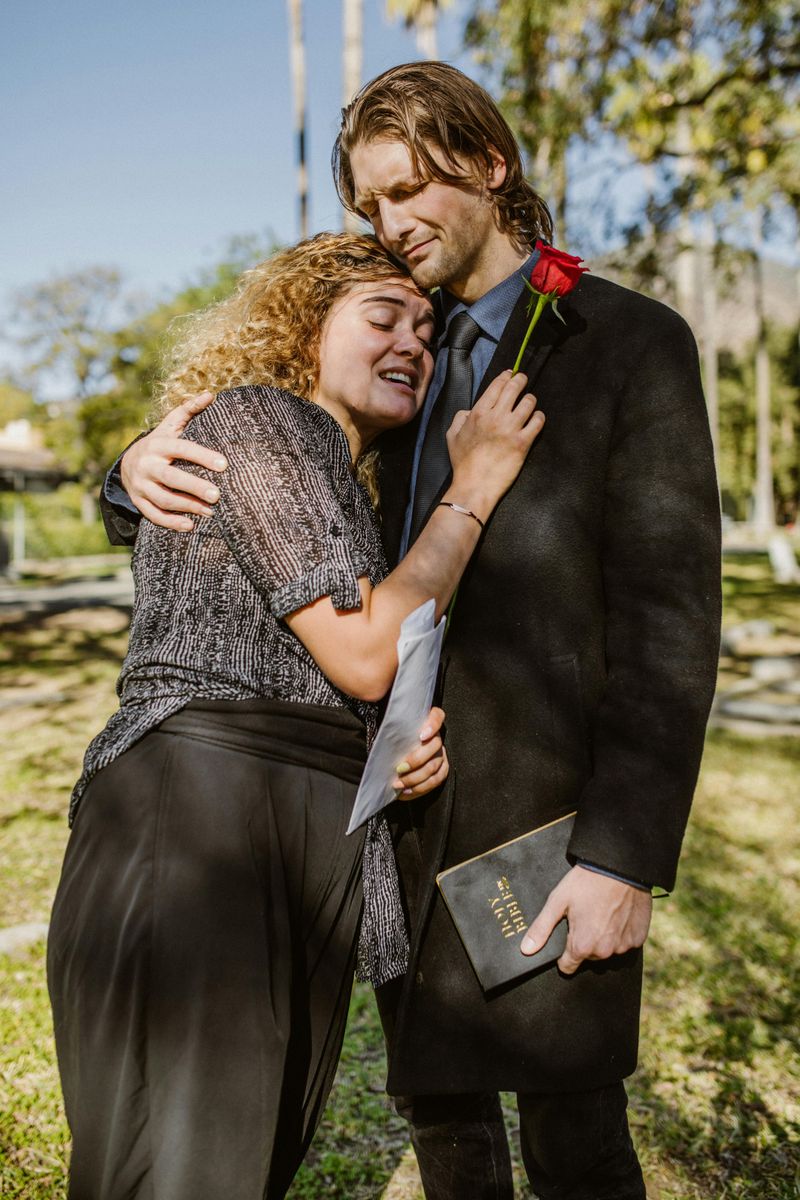Everyday Expressions That Point to Lingering Trauma

The words we use every day can reveal more about our inner world than we realize. Sometimes, common phrases or statements actually signal unresolved emotional wounds from our past. Understanding these verbal clues helps us recognize when we or someone we care about might be carrying hidden pain that needs healing.
1. “I don’t want to bother anyone.”

People who frequently say this often learned early that their needs were inconvenient to others. This belief typically forms when caregivers responded with irritation or neglect when the person needed attention or help.
The fear of being a burden runs deep and creates a pattern of denying personal needs. Someone using this phrase might regularly put others first to an unhealthy degree, feeling guilty when asking for even small favors.
This self-effacing behavior serves as a protective shield against potential rejection. By expecting nothing, they avoid disappointment and maintain relationships, even at the cost of their own wellbeing.
2. “It’s not a big deal, I’m fine.”

Behind these seemingly casual words often hides a history of having emotions dismissed or punished. The person learned that expressing hurt wasn’t safe or acceptable, so they developed a habit of minimizing their own pain.
Watch for this phrase when someone is clearly upset but quickly brushes it off. They’ve likely trained themselves to suppress feelings as a survival mechanism, believing their emotions don’t matter or would burden others.
This pattern of self-invalidation creates a disconnection from genuine feelings. The person might struggle to recognize when something truly bothers them, leading to built-up resentment or unexpected emotional outbursts later.
3. “I should have known better.”

This harsh self-judgment often echoes critical voices from the past. When someone repeatedly blames themselves this way, they’re revealing a core belief that mistakes are unforgivable character flaws rather than normal human experiences.
The roots typically grow from environments where perfection was demanded or where natural learning processes weren’t respected. Children raised with excessive criticism or punishment develop this internal critic that continues long after the external voices stop.
Notice how this phrase assigns blame without compassion. The person expects themselves to have impossible foresight, holding themselves to unrealistic standards no one could meet. This relentless self-criticism becomes an exhausting companion through life.
4. “People always leave.”

When someone matter-of-factly states this belief, they’re revealing deep wounds around attachment and trust. Their emotional history likely contains significant losses or abandonments that taught them relationships are temporary and painful.
The word “always” signals an entrenched pattern of expecting rejection. Early experiences of inconsistent caregiving, parental absence, or sudden relationship endings create this expectation of inevitable abandonment. The person might unconsciously sabotage relationships or maintain emotional distance as protection.
Behind this phrase lies a painful paradox: desperately wanting connection while simultaneously fearing it. This conflicted approach to relationships often leads to a self-fulfilling prophecy where their fear of abandonment creates the very outcome they dread.
5. “I can’t trust anyone.”

Trust isn’t naturally missing – it gets broken. This statement reveals painful betrayals that taught someone that vulnerability leads to harm. The person likely experienced situations where those meant to protect them caused damage instead.
Rather than a stubborn choice, this distrust serves as emotional armor. Each time someone proved untrustworthy, another layer of protection formed. Now the person approaches relationships with caution, watching for warning signs and keeping parts of themselves hidden.
Look for inconsistent behavior in those who express this belief. They might alternate between guarded distance and desperate connection, never finding comfortable middle ground. This exhausting vigilance consumes energy that could otherwise nurture healthy relationships.
6. “I just don’t deserve good things.”

Such raw honesty about perceived unworthiness reveals deep wounds to someone’s fundamental sense of value. This belief rarely develops in a vacuum – it usually forms through direct messaging or traumatic experiences that a person internalized as evidence of their inadequacy.
Children who experienced conditional love, neglect, or abuse often absorb the message that they are inherently flawed. The belief becomes self-perpetuating as the person unconsciously sabotages opportunities or rejects positive experiences that contradict this core belief.
Notice how someone expressing this might downplay achievements or deflect compliments. Their relationship with happiness becomes complicated – good fortune creates anxiety rather than joy because it conflicts with their established identity as someone undeserving.
7. “If I don’t do it perfectly, it doesn’t count.”

Perfectionism often masquerades as high standards, but this statement reveals its true nature as a trauma response. The rigid thinking suggests the person learned that their value depended entirely on flawless performance rather than effort or growth.
Many perfectionists grew up in environments where love or safety felt conditional on achievement. A parent’s disappointment, criticism, or unpredictable anger taught them that mistakes carried dangerous consequences. Now as adults, they continue this pattern, believing perfection will keep them safe from rejection.
Watch for the all-or-nothing thinking in this statement. The person doesn’t see partial success as valuable – it’s either perfect or worthless. This binary approach creates immense pressure and prevents them from enjoying the natural learning process that comes with being human.
8. “I don’t remember much from that time.”

Not all memory lapses are accidental. In many cases, they’re signs of the brain’s defense system at work—suppressing or dissociating from experiences that were too overwhelming to store in conscious memory.
When events exceed our capacity to process them emotionally, the brain sometimes fragments or stores memories differently. Someone who experienced chronic stress, abuse, or a traumatic event might have entire periods of their life that feel foggy or inaccessible. This isn’t deliberate forgetting but an automatic survival response.
Listen for the confusion or frustration that might accompany this statement. Many people find these memory gaps disturbing, sensing important pieces of their story are missing. The blank spaces themselves become a source of distress, creating a disconnected relationship with their personal history.
9. “I don’t get too close to people.”

That distance you feel? It’s not carelessness—it’s caution. When someone acknowledges keeping others away, they’re pointing to a self-protective system forged from past experiences with vulnerability that didn’t end well.
The casual way this might be stated often masks deep fear. Past experiences taught them that emotional intimacy leads to pain – perhaps through betrayal, loss, or having their openness used against them. Each disappointment reinforced the message that closeness equals danger.
Look for the contradictions in someone who says this. They may simultaneously crave connection while actively preventing it, creating a lonely existence that feels safer than risking hurt. Their relationships often follow predictable patterns: initial openness followed by deliberate withdrawal once things become too intimate.
10. “It’s safer if I keep my feelings to myself.”

Emotional suppression becomes a survival skill when expressing feelings has led to punishment, rejection, or being used as a weapon. This statement reveals someone who learned that authentic emotions weren’t welcome or were dangerous to share.
Many children grow up in environments where certain emotions were forbidden or exploited. A parent who responded with anger to a child’s sadness, or who used vulnerabilities against them, teaches powerful lessons about emotional expression. The person developed a habit of swallowing feelings to maintain safety.
Notice the word “safer” – it acknowledges the perceived threat in emotional honesty. This protective barrier prevents both harm and connection, creating relationships that remain superficial. Inside, unexpressed feelings accumulate, often emerging later as physical symptoms or emotional outbursts that seem disproportionate.
11. “I knew this would happen, it always does.”

There’s resignation in their words—a quiet surrender shaped by a history of letdowns. This isn’t mere pessimism; it’s the product of repeated experiences where effort made no difference. Psychologists call it learned helplessness.
The fatalistic tone points to someone who stopped fighting against what feels inevitable. They may have experienced situations where escape seemed impossible, like childhood abuse, domestic violence, or prolonged failure despite genuine effort. Their brain learned to conserve energy by accepting the pain rather than resisting it.
Pay attention to the emotional flatness that often accompanies these words. The person might describe devastating events with unusual calm, having disconnected from the natural emotional response. This detachment served as protection when feelings were too overwhelming to process.
12. “I just want to disappear.”

This haunting wish speaks to profound emotional pain and overwhelm. When someone expresses this desire, they’re revealing feelings of worthlessness so deep that non-existence seems preferable to continuing their current experience.
The roots often trace back to environments where the person felt fundamentally unwanted or like a burden. Children who were ignored, rejected, or made to feel they caused problems may develop this escape fantasy. Rather than active self-harm, the wish to disappear often represents exhaustion with the effort of existing while feeling unwanted.
Listen for the longing for relief in this statement. The person isn’t necessarily seeking death but rather an end to suffering they can’t see another way out of. This expression signals someone who urgently needs compassion and professional support to find healthier ways to address their pain.
13. “I can handle it alone.”

What looks like strong independence can sometimes be quiet self-protection. When help was once met with rejection or disappointment, self-reliance becomes a shield. The exterior is capable, but the wound underneath is real.
Many who insist on handling everything alone learned early that their needs wouldn’t be met by others. Perhaps caregivers were absent, unreliable, or responded with irritation to normal childhood dependence. The person adapted by becoming prematurely self-sufficient, taking pride in needing no one.
Observe the physical tension that often accompanies this statement. The person might physically struggle rather than accept assistance, their body reflecting their emotional stance. This extreme self-reliance creates a paradox: they prove their worth through independence while simultaneously reinforcing the belief that they’re unworthy of support.
14. “I shouldn’t complain, others have it worse.”

While compassion is a strength, it can become a form of self-neglect when it invalidates your own pain. This mindset often stems from the belief that only extreme suffering deserves attention—or that theirs never will.
The origins often lie in environments where emotions were ranked or where expressing needs was met with shame or comparisons. Children told “stop crying, some kids don’t even have food” learn their feelings only matter in relation to others’ circumstances, not as valid experiences in themselves.
Notice how this phrase shuts down conversation and vulnerability. The person uses comparison as a tool for self-silencing, effectively cutting off potential support. While appearing humble or grateful, they’re actually reinforcing harmful beliefs about their right to acknowledge suffering or seek comfort.
15. “I don’t know who I really am.”

Identity confusion in adulthood often signals developmental disruption. This honest admission reveals someone who lacked the consistent mirroring and validation children need to develop a solid sense of self.
Many who express this uncertainty grew up in environments where they had to become what others needed rather than discover their authentic nature. Perhaps they had to please unpredictable caregivers, take on adult responsibilities too early, or suppress their true personality to avoid conflict. Their true self went underground for protection.
The confusion carries a distinct emptiness. The person might adopt different personalities in different relationships or feel like they’re performing rather than living authentically. They often describe feeling like an impostor or chameleon, skilled at becoming whatever each situation requires while losing touch with their core identity.
16. “I can’t relax, something bad might happen.”

Always scanning for danger takes a toll. For some, it’s not paranoia—it’s a nervous system conditioned by past harm, still acting as though the worst could happen at any moment.
The hypervigilance typically develops from living in genuinely unsafe conditions where alertness was necessary for survival. Children from unpredictable homes with substance abuse, violence, or emotional volatility learned to scan constantly for danger signs. Their bodies never received the consistent safety signals needed to develop normal relaxation responses.
Observe the physical manifestations that accompany this mindset. The person might startle easily, struggle with sleep, or position themselves to see exits in public places. What appears as anxiety or control issues is actually the body’s adaptive response to perceived threat – a survival mechanism that once served a crucial purpose but now limits their ability to experience peace.

Comments
Loading…